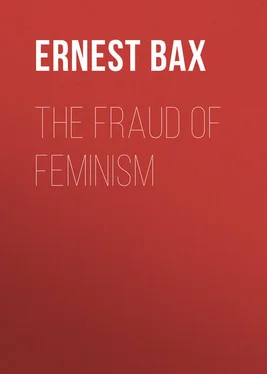Ernest Bax - The Fraud of Feminism
Здесь есть возможность читать онлайн «Ernest Bax - The Fraud of Feminism» — ознакомительный отрывок электронной книги совершенно бесплатно, а после прочтения отрывка купить полную версию. В некоторых случаях можно слушать аудио, скачать через торрент в формате fb2 и присутствует краткое содержание. Жанр: foreign_antique, foreign_prose, на английском языке. Описание произведения, (предисловие) а так же отзывы посетителей доступны на портале библиотеки ЛибКат.
- Название:The Fraud of Feminism
- Автор:
- Жанр:
- Год:неизвестен
- ISBN:нет данных
- Рейтинг книги:3 / 5. Голосов: 1
-
Избранное:Добавить в избранное
- Отзывы:
-
Ваша оценка:
- 60
- 1
- 2
- 3
- 4
- 5
The Fraud of Feminism: краткое содержание, описание и аннотация
Предлагаем к чтению аннотацию, описание, краткое содержание или предисловие (зависит от того, что написал сам автор книги «The Fraud of Feminism»). Если вы не нашли необходимую информацию о книге — напишите в комментариях, мы постараемся отыскать её.
The Fraud of Feminism — читать онлайн ознакомительный отрывок
Ниже представлен текст книги, разбитый по страницам. Система сохранения места последней прочитанной страницы, позволяет с удобством читать онлайн бесплатно книгу «The Fraud of Feminism», без необходимости каждый раз заново искать на чём Вы остановились. Поставьте закладку, и сможете в любой момент перейти на страницу, на которой закончили чтение.
Интервал:
Закладка:
CHAPTER I
HISTORICAL
The position of women in social life was for a long time a matter of course. It did not arise as a question, because it was taken for granted. The dominance of men seemed to derive so obviously from natural causes, from the possession of faculties physical, moral and intellectual, in men, which were wanting in women, that no one thought of questioning the situation. At the same time, the inferiority of woman was never conceived as so great as to diminish seriously, much less to eliminate altogether, her responsibility for crimes she might commit. There were cases, of course, such as that of offences committed by women under coverture, in which a diminution of responsibility was recognised and was given effect to in condonation of the offence and in mitigation of the punishment. But there was no sentiment in general in favour of a female more than of a male criminal. It entered into the head of no one to weep tears of pity over the murderess of a lover or husband rather than over the murderer of a sweetheart or wife. Similarly, minor offenders, a female blackmailer, a female thief, a female perpetrator of an assault, was not deemed less guilty or worthy of more lenient treatment than a male offender in like cases. The law, it was assumed, and the assumption was acted upon, was the same for both sexes. The sexes were equal before the law. The laws were harsher in some respects than now, although not perhaps in all. But there was no special line of demarcation as regards the punishment of offences as between men and women. The penalty ordained by the law for crime or misdemeanour was the same for both and in general applied equally to both. Likewise in civil suits, proceedings were not specially weighted against the man and in favour of the woman. There was, as a general rule, no very noticeable sex partiality in the administration of the law.
This state of affairs continued in England till well into the nineteenth century. Thenceforward a change began to take place. Modern Feminism rose slowly above the horizon. Modern Feminism has two distinct sides to it: (1) an articulate political and economic side embracing demands for so-called rights; and (2) a sentimental side which insists in an accentuation of the privileges and immunities which have grown up, not articulately or as the result of definite demands, but as the consequence of sentimental pleading in particular cases. In this way, however, a public opinion became established, finding expression in a sex favouritism in the law and even still more in its administration, in favour of women as against men.
These two sides of Modern Feminism are not necessarily combined in the same person. One may, for example, find opponents of female suffrage who are strong advocates of sentimental favouritism towards women in matters of law and its administration. On the other hand you may find, though this is more rare, strong advocates of political and other rights for the female sex, who sincerely deprecate the present inequality of the law in favour of women. As a rule, however, the two sides go together, the vast bulk of the advocates of “Women’s Rights” being equally keen on the retention and extension of women’s privileges. Indeed, it would seem as though the main object of the bulk of the advocates of the “Woman’s Movement” was to convert the female sex into the position of a dominant sexe noblesse . The two sides of Feminism have advanced hand in hand for the last two generations, though it was the purely sentimental side that first appeared as a factor in public opinion.
The attempt to paint women in a different light to the traditional one of physical, intellectual and moral inferiority to men, probably received its first literary expression in a treatise published in 1532 by Cornelius Agrippa of Nettesheim entitled De Nobilitate et Praecellentia Feminei Sexus and dedicated to Margaret, Regent of the Netherlands, whose favour Agrippa was at that time desirous of courting. The ancient world has nothing to offer in the shape of literary forerunners of Modern Feminism, although that industrious collector of historical odds and ends, Valerius Maximus, relates the story of one Afrania who, with some of her friends, created disturbances in the Law Courts of ancient Rome in her attempt to make women’s voices heard before the tribunals. As regards more recent ages, after Agrippa, we have to wait till the early years of the eighteenth century for another instance of Feminism before its time, in an essay on the subject of woman by Daniel Defoe. But it was not till the closing years of the eighteenth century that any considerable expression of opinion in favour of changing the relative positions of the sexes, by upsetting the view of their respective values, founded on the general experience of mankind, made itself noticeable.
The names of Mary Wollstonecraft in English literature and of Condorcet in French, will hardly fail to occur to the reader in this connection. During the French Revolution the crazy Olympe de Gouges achieved ephemeral notoriety by her claim for the intellectual equality of women with men.
Up to this time (the close of the eighteenth century) no advance whatever had been made by legislation in recognising the modern theory of sex equality. The claims of women and their apologists for entering upon the functions of men, political, social or otherwise, although put forward from time to time by isolated individuals, received little countenance from public opinion, and still less from the law. What I have called, however, the sentimental aspect of Modern Feminism undoubtedly did make some headway in public opinion by the end of the eighteenth century, and grew in volume during the early years of the nineteenth century. It effectuated in the Act passed in 1820 by the English Parliament abolishing the punishment of flogging for female criminals. This was the first beginning of the differentiation of the sexes in the matter of the criminal law. The parliamentary debate on the Bill in question shows clearly enough the power that Sentimental 1 1 I should explain that I attach a distinct meaning to the word sentimental ; as used by me it does not signify, as it does with most people, an excess of sentiment over and above what I feel myself, but a sentiment unequally distributed. As used in this sense, the repulsion to the flogging of women while no repulsion is felt to the flogging of men is sentimentalism pure and simple. On the other hand the objection to flogging altogether as punishment for men or women could not be described as sentimentalism, whatever else it might be. In the same way the anti-vivisectionist’s aversion to “physiological” experiments on animals, if confined to household pets and not extended to other animals, might be justly described as sentimentalism; but one who objected to such experiments on all animals, no matter whether one agreed with his point of view or not, could not be justly charged with sentimentalism (or at least, not unless, while objecting to vivisection, he or she were prepared to condone other acts involving an equal amount of cruelty to animals).
Feminism had acquired in public opinion in the course of a generation, for no proposal was made at the same time to abolish the punishment of flogging so far as men were concerned. Up to this time the criminal law of England, as of other countries, made no distinction whatever between the sexes in the matter of crime and punishment, or at least no distinction based on the principle or sentiment of sex privilege. (A slight exception might be made, perhaps, in the crime of “petty treason,” which distinguished the murder of a husband by his wife from other cases of homicide.) But from this time forward, legislation and administration have diverged farther and farther from the principle of sex equality in this connection in favour of female immunity, the result being that at the present day, assuming the punishment meted out to the woman for a given crime to represent a normal penalty, the man receives an additional increment over and above that accorded to the crime, for the offence of having been born a man and not a woman .
Интервал:
Закладка:
Похожие книги на «The Fraud of Feminism»
Представляем Вашему вниманию похожие книги на «The Fraud of Feminism» списком для выбора. Мы отобрали схожую по названию и смыслу литературу в надежде предоставить читателям больше вариантов отыскать новые, интересные, ещё непрочитанные произведения.
Обсуждение, отзывы о книге «The Fraud of Feminism» и просто собственные мнения читателей. Оставьте ваши комментарии, напишите, что Вы думаете о произведении, его смысле или главных героях. Укажите что конкретно понравилось, а что нет, и почему Вы так считаете.












